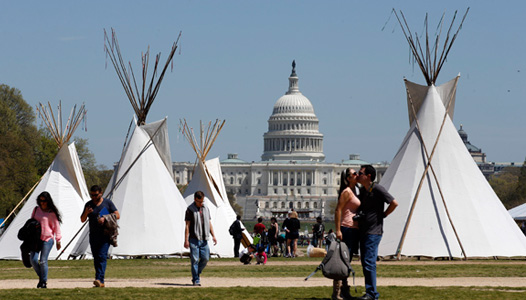
Cowboys and Indians are fighting on the same side this week in the nation’s capital.
The Cowboy and Indian Alliance is marching on the Capitol in Washington for Earth Day today through April 27 to protest the TransCanada Keystone XL Pipeline. The group is setting up a tipi camp outside the White House for the five-day duration of the protests.
The protest camp will formally close on April 27, with the message of “reject the Keystone XL.” Saturday, April 26 has been designated as “a day of action.” On that date everyone present will be asked to put his or her thumbprint mark on a tipi.
There will be speakers from the tribal peoples, ranchers, farmers and refinery committee members who will be directly affected by the pipeline and its tar sands oil. The speakers have pledged to lead the resistance should KXL be approved at any point. The Alliance is inviting everyone to come to their tipi camp on the National Mall to put more public pressure on President Obama to eventually reject the Keystone Pipeline altogether.
The Alliance is a coalition of Native American Nations, ranchers and farmers who live along the route of the proposed pipeline. In what is a historic first in decades, Native peoples and white farmers and ranchers are united in common cause against a common enemy. This unity was prompted by realization of the deadly danger of tar sands oil to all human beings, irrespective of race or nationality.
When tar sands oil (also known as diluted bitumen or dilbit) spills it emits a smell that causes immediate physical sickness including dizziness, burning throats, headaches and watery eyes. Bitumen is the thickest, dirtiest of oil with the consistency of peanut butter. To move it through the pipelines it must be either diluted or heated to extremely high temperatures. Tar sands oil spills pose extremely difficult cleanup problems because of the drastic measures oil companies must use to transport this hazardous sludge toward faraway refineries. This is a main reason why the Cowboy and Indian Alliance is fighting so hard to stop TransCanada from obtaining White House approval.
In Nebraska there is a massive underground water supply – the Ogallala Aquifer – that is also a source of water for several other states in the region. If TransCanada ever succeeded in ramming the KXL Pipeline through this ecologically sensitive and vulnerable region, the water supply of millions of people would be frightfully jeopardized. An oil spill would ruin the entire region beyond repair and the Native nations, farmers and ranchers realize this all too well. That is why the Alliance has resolved to do everything in its power to stop the pipeline in its oil soaked tracks.
As for the late April Alliance protest a list of organizations in support includes Oceti Sakowin People of the Seven Council Fires, Bold Nebraska, 350.org, CREDO, The Sierra Club, Center for Biological Diversity, Chesapeake Climate Action Network, Conservation Law Foundation, Labor Network for Sustainability, and the Natural Resource Defense Council.
As of April 18t the White House announced a delay of the Pipeline decision: a delay is good, but what is needed is a Presidential rejection. At stake is the health and lives of millions. The KXL Pipeline must be defeated! Join the actions in Washington DC!
Photo: This morning at the Capitol. AP Photo












Comments